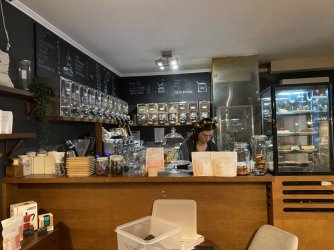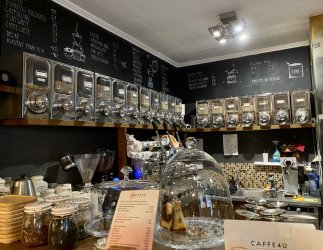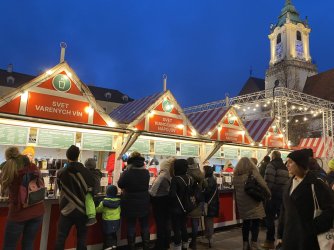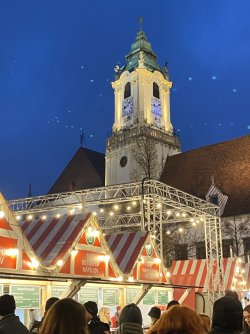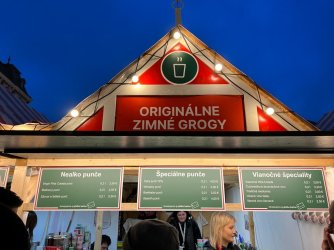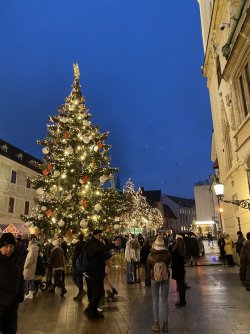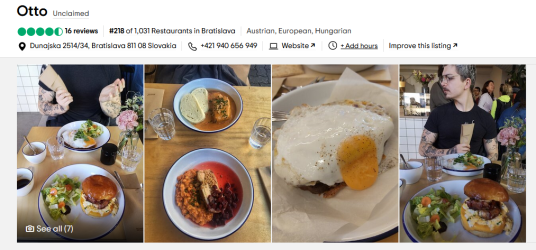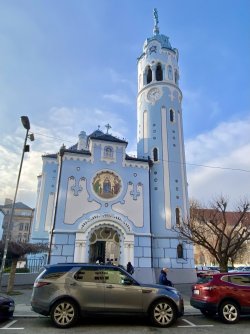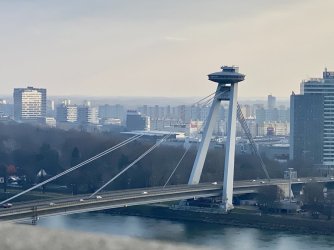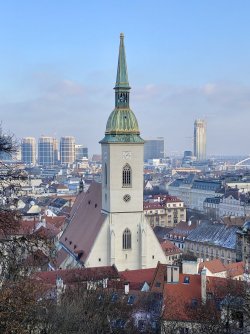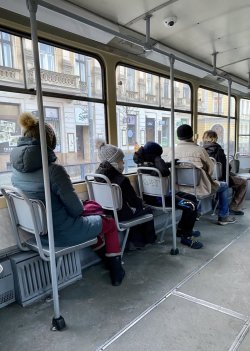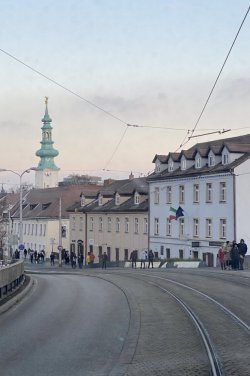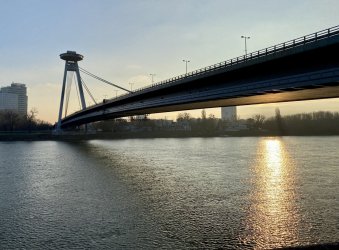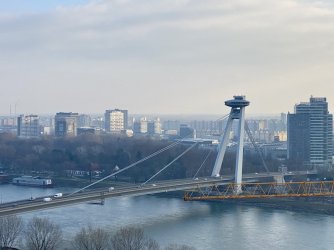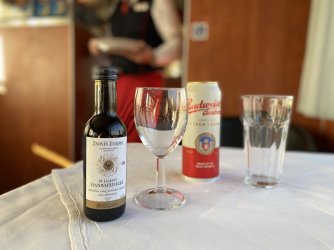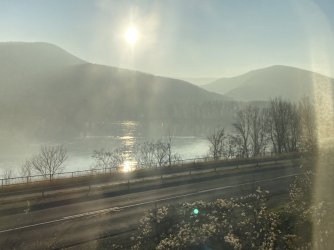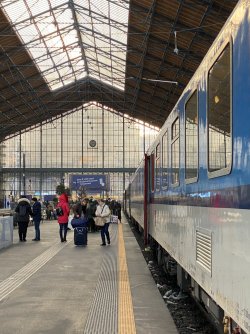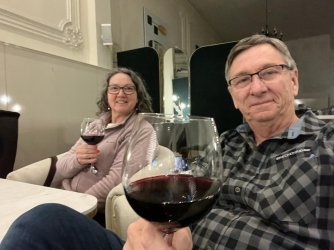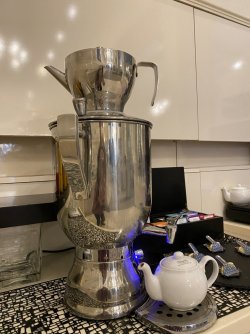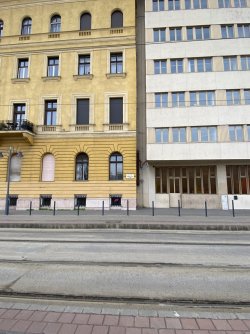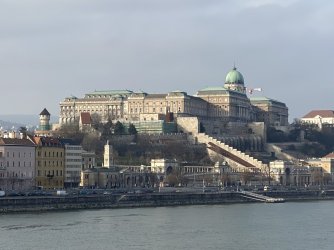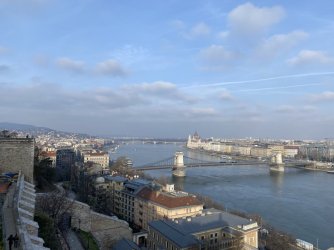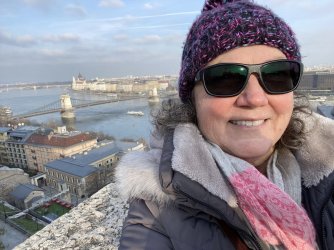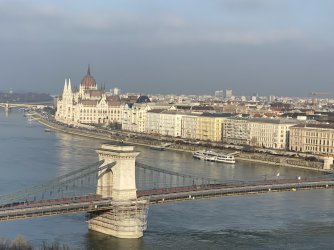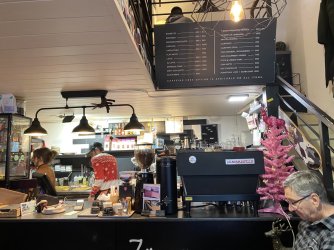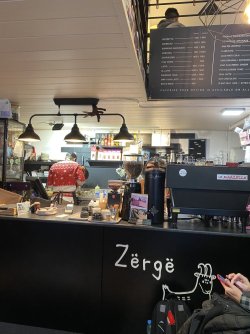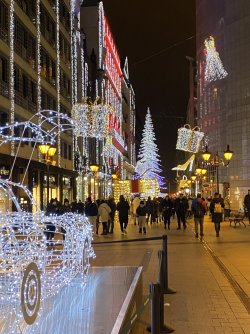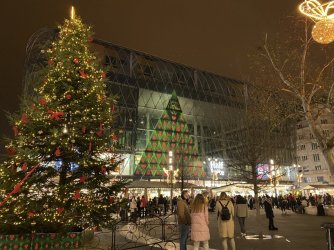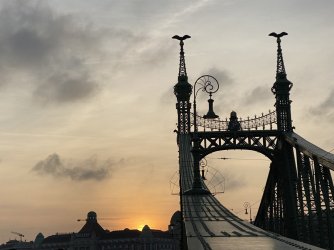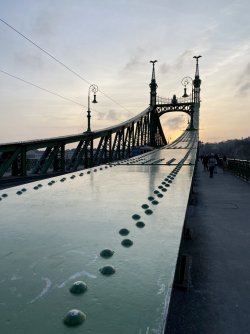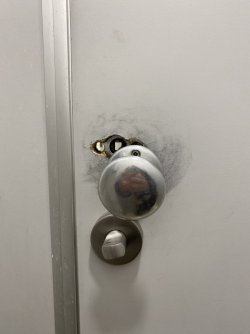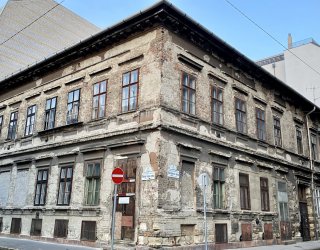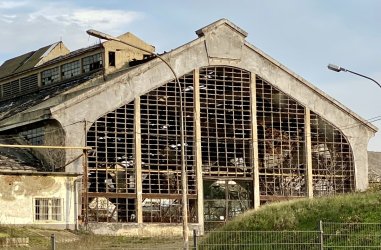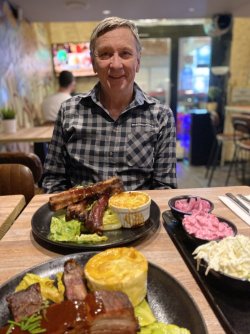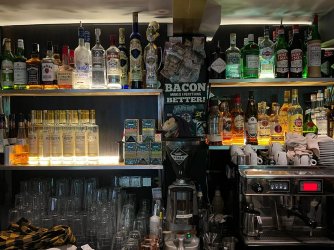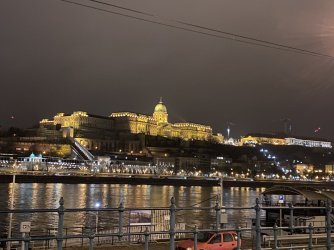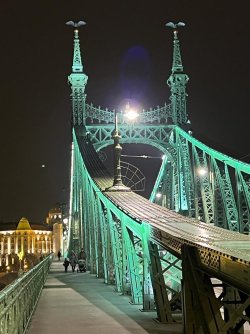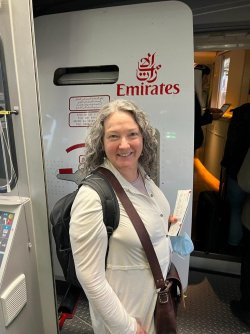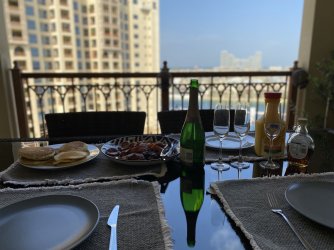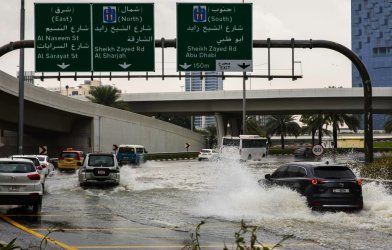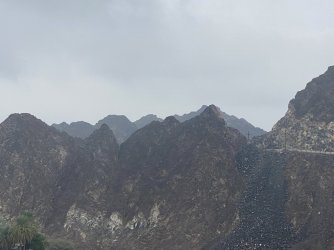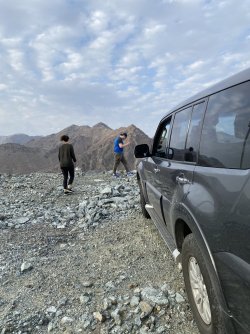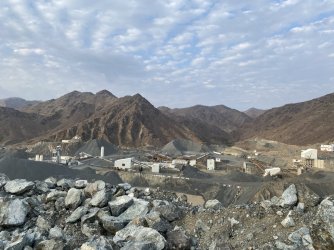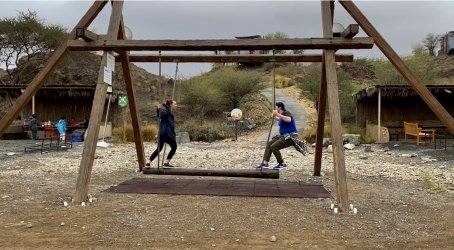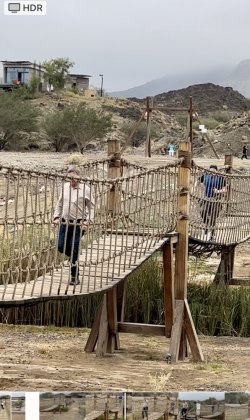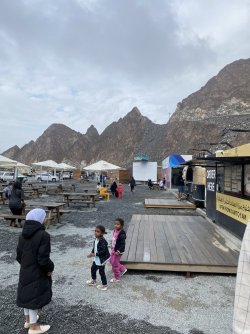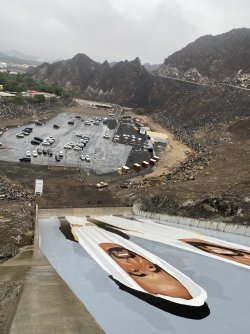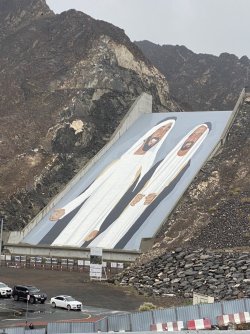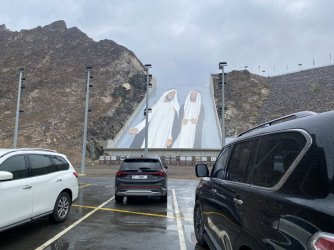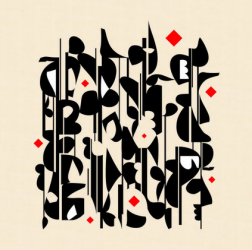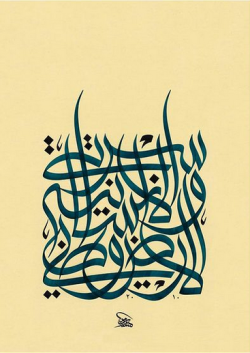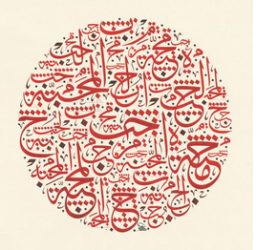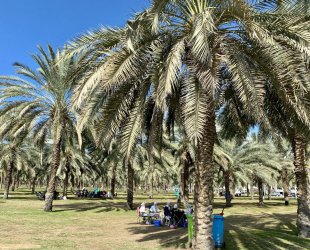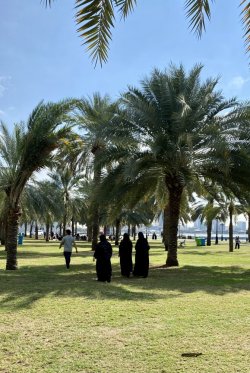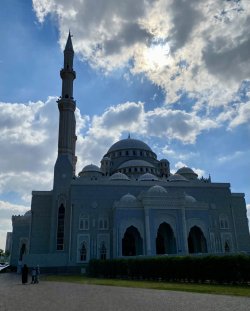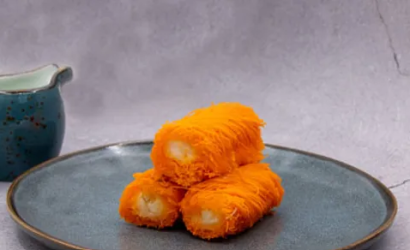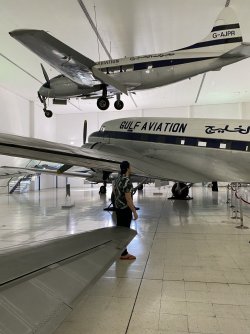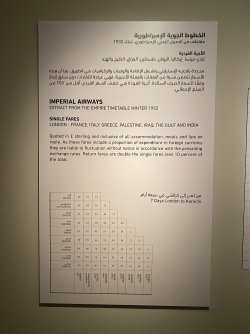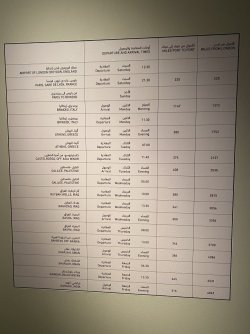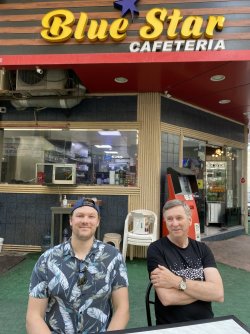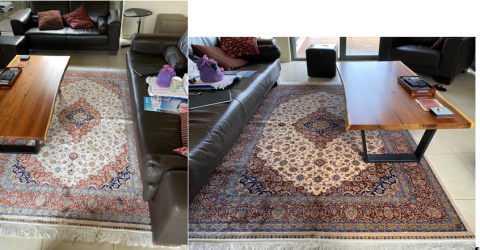Bratislava Friday 16 December 2022
For this stay at the Ibis, we could not go past the option of a full breakfast for €9 per person. We had not bothered at any of the other Accor properties (Munich, Berlin and Prague) because of cost of €20-28 per person. Much cheaper and pretty easy in those places to buy pastry, coffee, yoghurt and fruit. But for €9 we were tempted - and not disappointed! It was a very central European experience - collect a breakfast ticket each day from reception after checking we were eligible. Hand this to the concierge at the breakfast room - further checking of eligibility. Escorted to an assigned seat. Have at the huge buffet, which contained all the classic central European breakfast items of cabbage rolls, cucumber and dill salad, tomato salad, hard boiled eggs, some kind of smoked fish, lots of hams, salamis and other delicatessen meats, all kinds of cheeses, nuts and dried fruits, yoghurts and quarks, so many types of heavy breads including pumpernickel, light rye and carraway seed, and some slightly odd things like cornflakes and muesli (that both truly tasted like cardboard), tinned fruit salad and tinned orange juice. Plus the strongest, most bitter coffee I have ever tasted (and remember we just came from the Middle East

) - it was literally undrinkable until I made it up like cordial. I poured about 5 cm into my mug, added the hot tea water, then some milk and sugar, which I don't usually add to coffee, and just about managed to drink it. There were the usual opaque rules about using new plates, getting fresh cutlery, and the need to return and sort your waste and put your used dishes on a tray, your used utensils in a basin of water and so on. It was overall a great experience and an excellent and substantial start to the day ahead. Sorry, no photos taken, too busy eating after our meagre rations the night before.
Then we walked to the meet up point for our Post-Communist Slovakia tour organised through the excellent Authentic Solvakia company with our guide Brano. The winter tour offerings were somewhat limited, but they have a lot of tours for those travelling in the summer, and I would highly recommend them. Brano was excellent - had an encyclopaedic knowledge of his country's history and culture, spoke excellent English (his high school teacher was an Aussie of Czechoslovakian heritage who came to find his roots, found love, and stayed) and a great sense of humour in delivery! All questions were welcomed and answered in a non-defensive way. Our vehicle for the tours was a 1992 VW Transporter in original condition (rusty and beaten up) to add to the authenticity of the tour. Those going is summer can ride in Skoda and Trabant vehicles of the immediate post-communist era, but these are not safe in winter conditions. We were originally quoted €50 per person, as we were the only 2 on the tour, but when 2 others joined our fee was reduced to €35 per person without asking
@RooFlyer!
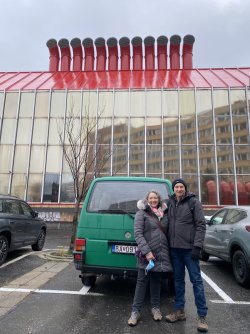
Tours in Bratislava, Slovakia with local guides: Soviet era sightseing communist tour in retro Škoda car, bike tour, wine tour, castle tour and more!

www.authenticslovakia.com
I learned so much history on this tour including the originally democratic roots of the country, followed by the slide to fascism and close alliance with Germany in WW2 and then the communist era. Over time, Germany annexed both Austria and the Czech part of Czechoslovakia, but allowed the Slovak part to remain "independent" meaning it was relatively untouched by WW2 until late in 1944. By 1945, many areas were "liberated' from the Germans by the Russians, and soon thereafter the Slovaks freely elected a Communist government, and from there, the Iron Curtain began to operate. During the 1960s, Czechoslovakia flirted with the "liberal ordnung" view of Communism and citizens were allow to associate freely, travel abroad and own properties and businesses, which was all very suddenly and harshly repressed in August 1968 when Russia sent in tanks to enforce more austere conditions. From here it was Iron Curtain all the way until the early 1990s, with Czechia and Solvakia becoming separate countries on 1 January 1993.
Brano now describes Slovakia as being on "turbo capitalism" as a completely user pays state - for example there is no social housing provided by the state.
On our tour, we saw the first prefabricated public housing built in 1956, complete with rousing soviet murals over the entry ways - but otherwise in the brutalist style. Buildings were constructed in 3-6 months, start to finish. Each apartment was 45 sq m (tiny), and allocated on communist principles - couples, couples with a child, couples with children all getting bigger and better apartments. Free and compulsory child care at 6 months of age and kindergarten so mothers could work
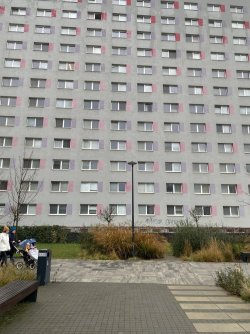
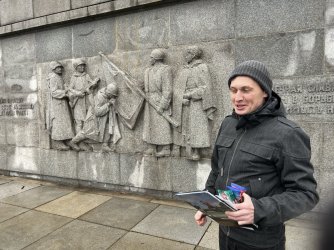
Next stop was a soviet era market Tržnica which still operates today for an older clientele aged 65+ nostalgic for the "good old days". It's heritage listed. Note the Vietnamese food place - there was a lot of migration from North Vietnam to the CSSR during the Communist period. Also note the quality drinking wine on sale for €1,50!
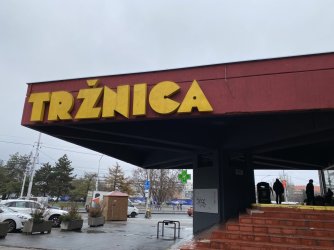
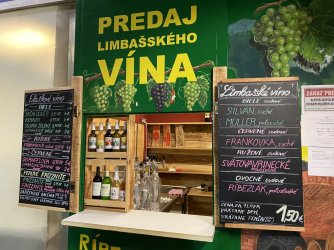
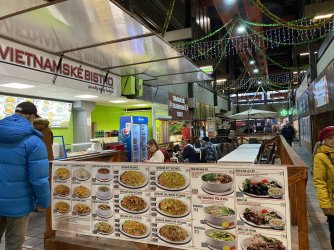
Also visited a lot of other soviet brutalist buildings and the Russian war Memorial, which usually offers an excellent view - not today as it was 2 degrees and foggy. We were given samples of typical communist era soft drinks, alcohol nips and chocolate bars that are still popular and sold here now.
By now, we were ready for lunch, and I will continue in another post.














